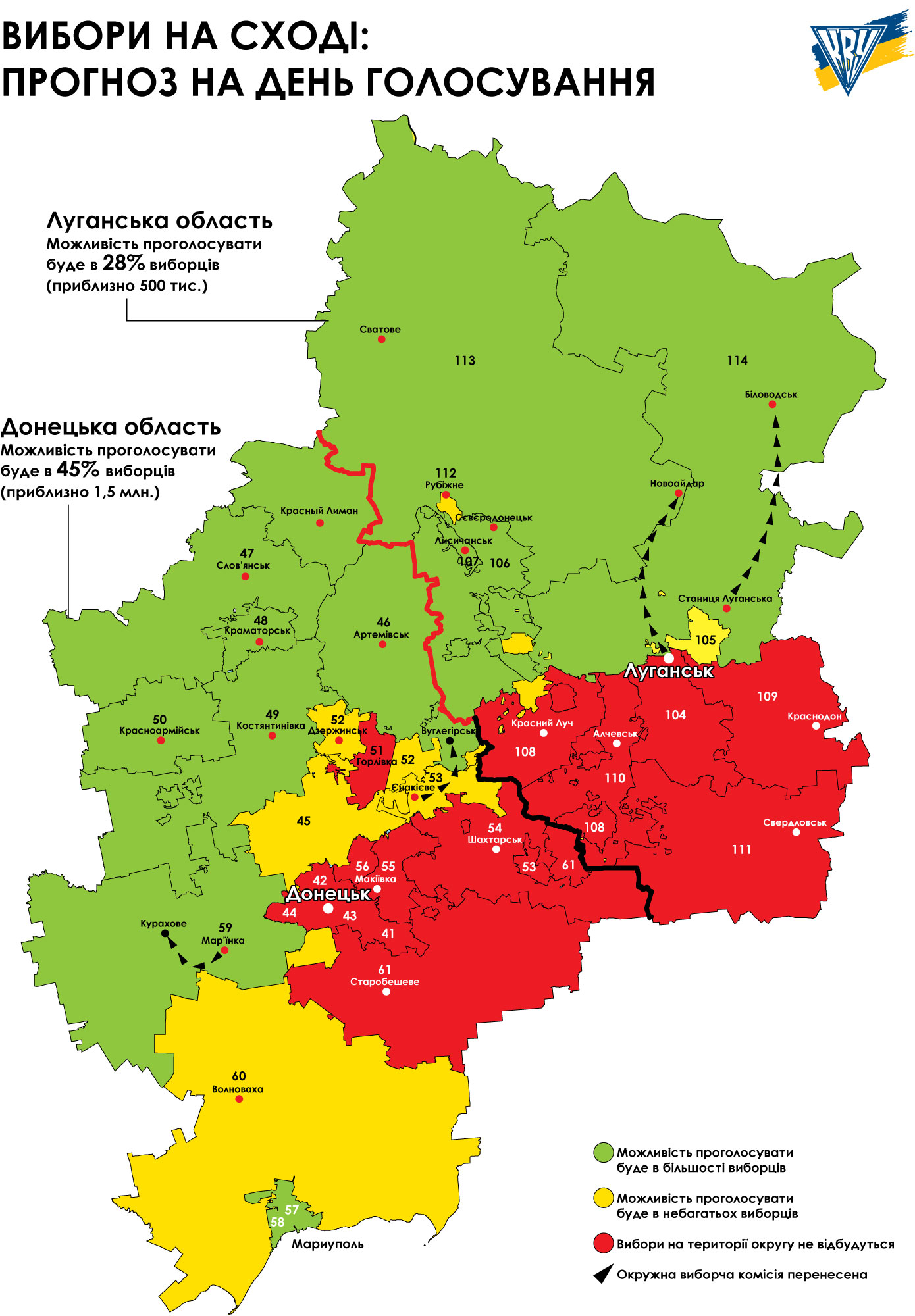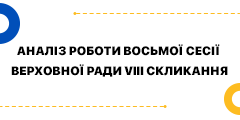1. Although the law "On Elections of People's Deputies of Ukraine" for the most part allows early elections of People's Deputies of Ukraine to be held according to international standards, some important issues of the election process remain unregulated and some existing provisions of the law require improvement. In particular, the law does not provide sufficient provisions for securing the security of election commissions, the transportation of election documentation of voting, vote counting and tabulation in areas controlled by the separatists. The law also does not effectively guarantee the electoral rights of ATO participants. Verkhovna Rada of Ukraine did not include the bill № 5157, which was to fill some gaps in the current law, into the agenda. Thus, filling these gaps is being performed by the CEC in a manner not fully consistent with the Constitution of Ukraine.
2. Positive measures include changes to articles 157 through 160 of the Criminal Code of Ukraine, which were approved by Parliament on October 14, 2014 and which expanded the definition of electoral crimes and strengthened responsibility for offense against voting rights. In the future, these changes can reduce the scale of vote-buying during preparation and during the elections, as well as provide, if used properly, the guarantee that election violations are prosecuted.
3. The main challenge facing the early parliamentary elections is the potential for disruption in most districts in Donetsk and Luhansk oblasts. At the same time, the general public has not been informed about which constituencies in these two oblasts that voting will still be possible. The CEC's position on this issue is also ambiguous. The CEC should address this problem, given the fact that elections do not only result in the selection of People's Deputies of Ukraine, but also have the potential to give rise to doubt about legitimacy and compliance with international standards if not properly held. If results of elections in single-seat constituencies will be determined by the protocols of only the precincts that managed to organize voting, the validity of such elections is questionable. This is concern applies particularly to DEC №104 in Luhansk oblast.
4. Additionally, an important challenge will be to prevent further attempts to disrupt the elections in districts under control by Ukrainian authorities but located in Donetsk and Luhansk oblasts, neighboring districts, and the Autonomous Republic of Crimea. The Ministry of Internal Affairs (MIA), the Security Service of Ukraine (SSU) and the Ministry of Defense of Ukraine should carefully analyze existing and potential risks to the electoral process within these regions and implement a plan to minimize these risks, focusing on the safety of voters. The MIA has adopt measures to strengthen protection of polling stations, but it is difficult to assess their effectiveness.
5. The CEC provides activities on preparation for the early elections in general according to the requirements of the law. Most of acts required for the proper application of the law "On Elections of People's Deputies of Ukraine" were adopted by the CEC before the beginning of election process.
6. However, the CEC's registration of candidates for People's Deputies of Ukraine was not always satisfactory. Many parliamentary candidates were refused registration on formal grounds, and corresponding CEC decisions were overturned by courts. As a result registration of candidates for election was prolonged until mid-October 2014, due to the fact that the CEC had to implement court decisions on registration of candidates who the courts determined had been illegally denied registration. Such candidates will have opportunity to campaign for less than 10 days, which put them at an unfair disadvantage.
7. Although the law "On Elections of People's Deputies of Ukraine" contains a number of guarantees of elections transparency, many decisions and DEC meeting minutes were not released on the CEC website. The CEC should take steps to ensure the strict compliance with all requirements of the law on transparency of election commissions activities.
8. Funding of pre-election campaigning remains not transparent. As of October 21, 2014 the CEC website published only 2 of 29 financial statements from parties on the receipt and use of election funds; the reports of some candidates were submitted only to 80 of 213 DECs. Since the reporting period ended shortly before the end of candidates' registration, many candidates consequently did not reflect in their statements either receipts or the expenses of electoral funds. If statements of parties have been submitted to the CEC, the CEC should ensure their immediate publication as stipulated by the law. The CEC also should take steps to speed up the publication of financial statements from candidates running in single-seat constituencies. In the future, the law should provide proportionate and dissuasive sanctions for failure or late submission of financial statements on the receipt and use of election funds, as well as on inclusion false information to these reports. Such reports should also reflect information for the maximum long period before the election (for example, since opening of election funds till the 5th day before the Election Day).
9. As during presidential election of 2014, the problem of stable DEC and PEC composition remains important. According to CVU information, changes in DEC membership will be close to 40%, while PEC membership will be changed at a rate of 30 to 40%. Frequent changes in commission membership are not good for proper organization of the electoral process; they weaken the effectiveness of CEC and international donors' measures to train commission members on the proper organization of elections. In the future, election laws should be amended in order to narrow opportunities to replace commission members by entities who submit their nominations to the commission.
10. In some constituencies, DEC and PEC activities are in fact controlled by individual candidates for deputy who are in the group of campaign leaders. The CEC, election observers, and the media should pay special attention to the organization of voting, counting, and tabulation in such constituencies, as there is a high risk of election fraud in favour of the respective candidates.
11. In general, DECs provide activities in accordance with the law. The main problem of DEC work if lack of transparency: in some cases, DEC decisions are not released on information boards and not sent to the CEC. PEC formation, with the exception of Donetsk and Luhansk oblasts, is generally carried out in compliance with the law, although CVU observers have recorded a number of violations and deficiencies during their formation.
12. The quality of the State Voters Register database has improved compared to previous election campaigns, although CVU observers still recorded some errors in preliminary lists, including cases of "dead souls," and so on. A particularly important problem of the 2014 elections is securing the possibility for ATO members to vote, including their inclusion to voter lists, and the possibility of changing the place of voting without changing the registered voting address. Unfortunately, many voters involved in the ATO area will not be able to vote due to the passivity of legislators in resolving issues related to their participation in elections.
13. During the early parliamentary elections as well as during the presidential election in 2014, CVU observers have recorded queues of people near departments of the State Voter Register who wanted to change their registered place of voting. However, the number of such queues has decreased. In future elections, the CEC should conduct a more active information campaign on timely change of place of voting.
14. The right to change the place of voting without changing the voting address was used by relatively small percentage of internally displaced persons, which was also caused by the lack of information and educational activities of the CEC and local authorities on these issues.
15. During candidate registration and campaigning, unfair practices are still in use. In many constituencies, a significant number (50% or more) of so-called "technical" candidates are recorded; these candidates do not carry out campaigning and participate in elections just to detract votes from certain other candidates. Registration of "twins", i.e. candidates with identical last names, and even with same first names and patronymic, is widespread, although many of these candidates have been rejected from the ballot.
16. A positive development for the 2014 elections is reduction of the use of administrative resources during election by both parties and candidates. There only isolated reported incidents of officials participatin in campaign activities.
17. Despite recent entry into force of amendments to the Criminal Code of Ukraine, the candidates continue to use actively the tactic of direct and indirect bribery of voters, distributing money, goods, works, and services in person or through a network of activists, and through their own charitable foundations or networks of specifically employed persons ("brigadiers", etc.). Organs of Internal Affairs should give proper legal assessment of such acts, taking into account recent legislative changes.
18. Judging by the volume of television, radio, and outdoor advertising, the cost of its production and placement were not significantly reduced compared to previous elections (the decrease occurred only due to reduced duration of the electoral process). After election, the law "On Elections of People's Deputies of Ukraine" should be amended in order to prohibit paid political advertising on television and radio during the election process.
19. Campaign content is still of very poor content and is built on speculations about war and peace, lustration, and other similar topics. Meaningful discussions on the direction of the country's development are not held by political forces.
20. The quantity of hidden political advertising in media (so-called "jeans") is still significant.
21. The distinguishing feature of elections in 2014 is violence towards the candidates ("people's lustration", throwing eggs, attacks of activists, etc.). Law enforcement agencies should carefully examine relevant cases and ensure prosecution of persons who organize and/or fulfil illegal activities, as stipulated by the law.
22. As during presidential election in 2014, damage of campaign materials on outdoor advertising is massive. Law enforcement authorities should take measures to create conditions for free campaigning by parties and candidates, including posting campaign materials on billboards. Destruction or damage of such materials should be a subject of proper legal assessment and prosecution.
23. The number of cases of "black PR" against certain candidates increased during October. A significant number of deficiencies and violations in election campaign was caused due to the mixed electoral system. Future parliamentary elections should be held using proportional system of voting with open lists, which will enhance competitiveness and integrity of political competition and minimize bribery of voters by candidates.
24. Official observers of the Committee of Voters of Ukraine will be actively involved in monitoring of voting, counting and tabulation of votes to minimize disruption at the polls. The total number of observers will be at least 4 thousand. A number of districts (35-40% of total) causes particular concern for CVU representatives, as they recorded numerous complaints of violations of election laws, bribery of voters, spreading o false information about candidates. (DECs № 220 and 217 in Kyiv, № 93 and 96 in the Kyiv region, etc.). In these districts the CVU will delegate observers to the vast majority of stations.


